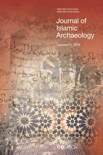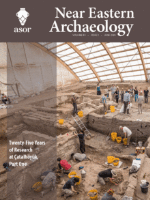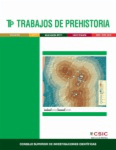
Conimbriga-Revista de Arqueologia
Scope & Guideline
Connecting Researchers to the Rich Tapestry of History
Introduction
Aims and Scopes
- Roman Archaeology:
The journal emphasizes studies related to Roman towns, settlements, and artifacts, providing insights into urban planning, daily life, and socio-political structures within Roman provinces. - Methodological Innovations:
It showcases non-invasive methods and innovative archaeological techniques that contribute to the detection and analysis of archaeological sites, reflecting a commitment to advancing methodological practices in the field. - Historical Contextualization:
Papers often place archaeological findings within broader historical narratives, examining the interplay between archaeology, history, and cultural developments from the Iron Age through the Middle Ages. - Material Culture Studies:
Research on ceramics, glass production, and other material artifacts is a core focus, highlighting the significance of everyday objects in understanding past societies. - Interdisciplinary Approaches:
The journal encourages interdisciplinary research that integrates archaeology with history, epigraphy, and environmental studies, fostering a comprehensive understanding of ancient cultures.
Trending and Emerging
- Non-Invasive Archaeological Techniques:
There is an increasing emphasis on non-invasive methods for site detection and analysis, highlighting a trend towards sustainable and ethical archaeological practices that minimize site disturbance. - Interdisciplinary Research on Trade and Economy:
Recent publications have shown a growing interest in the economic aspects of ancient societies, particularly trade networks during the Roman and Late Antique periods, indicating a shift towards understanding economic systems. - Medieval Archaeology:
An emerging focus on medieval archaeology, particularly the study of early medieval sites and artifacts, reflects a broader interest in the transitional phases following the fall of the Roman Empire. - Environmental Archaeology:
The integration of climate studies and environmental factors into archaeological research is gaining traction, emphasizing the relevance of ecological contexts in understanding past human behaviors and societal developments.
Declining or Waning
- Iron Age Studies:
Although earlier publications featured significant discussions on Iron Age societies in Portugal, recent issues have shifted focus towards Roman and late antique periods, indicating a waning interest in Iron Age topics. - Non-Roman Archaeological Contexts:
Research pertaining to archaeological contexts outside of Roman influence, such as early indigenous communities or pre-Roman cultures, seems to be receiving less attention, possibly overshadowed by the extensive focus on Romanization. - Historical Archaeology:
Themes related to historical archaeology, particularly those connecting archaeological findings to post-Roman historical narratives, have decreased, suggesting a narrowing of focus towards earlier periods.
Similar Journals

Mediterranean Archaeology & Archaeometry
Unveiling the Secrets of the Mediterranean PastMediterranean Archaeology & Archaeometry is a premier academic journal dedicated to advancing the fields of archaeology, anthropology, conservation, and history, published by UK Zhende Publishing Ltd. With its ISSN 1108-9628 and E-ISSN 2241-8121, this journal serves as a vital platform for scholars and practitioners to disseminate innovative research and findings related to the rich archaeological heritage of the Mediterranean region. It has gained remarkable recognition, achieving a Q2 ranking in anthropology and archaeology, and a Q1 classification in several categories including arts and humanities, conservation, and history as of 2023. Its impressive Scopus rankings underscore its impact, with a significant position in history (59/1760) and conservation (11/103) disciplines. Spanning years from 2008 to 2022, the journal invites open access contributions to foster collaboration and interdisciplinary dialogue among researchers, students, and professionals alike, making it an indispensable resource for those engaged in the exploration and preservation of historical narratives within the Mediterranean context.

ARCHAEOLOGY
Pioneering Archaeological Research for Future GenerationsARCHAEOLOGY is a distinguished peer-reviewed journal published by the Archaeological Institute of America, focusing on the multifaceted aspects of archaeological research and its relevance to contemporary society. Established in 1966, this journal serves as a critical platform for scholarly discourse in the field, showcasing innovative findings, theoretical advancements, and methodological discussions related to archaeology. While it maintains a Q4 ranking within the disciplines of archaeology and arts and humanities, its contributions remain valuable for those engaging in archaeological studies or seeking to understand historical and cultural narratives. The journal is accessible in print, with an ISSN of 0003-8113 and an E-ISSN of 1943-5746, ensuring that a wide audience can benefit from its insights. Although currently not classified as Open Access, the meticulous peer-review process ensures a high standard of academic rigor, making it an essential source for researchers, professionals, and students alike who are dedicated to exploring the past through archaeological lenses.

Journal of Islamic Archaeology
Preserving Islamic Heritage, One Artifact at a TimeJournal of Islamic Archaeology is a distinguished publication dedicated to advancing the field of archaeology through the lens of Islamic heritage and culture. Published by EQUINOX PUBLISHING LTD, this journal provides a platform for researchers, professionals, and students to disseminate their findings and engage in critical dialogue regarding the archaeological aspects of Islamic societies from 2014 to the present. With an ISSN of 2051-9710 and E-ISSN 2051-9729, the journal is indexed within significant academic databases and positioned notably in the Q3 and Q2 quartiles for archaeology in the Arts and Humanities and Social Sciences categories, respectively. The journal fosters scholarly exchange and innovation, drawing attention to the rich tapestry of Islamic archaeology, and securing its role as an essential resource for practitioners and academics alike. Its commitment to rigorous peer-review and high-quality contributions ensures a valuable repository of knowledge, enhancing the understanding of an often underrepresented field in archaeology.

Revista de Arqueologia Historica Argentina y Latinoamericana
Innovative Insights into the Archaeological Treasures of Latin AmericaRevista de Arqueologia Historica Argentina y Latinoamericana is a vital scholarly journal dedicated to the field of archaeology, with a particular focus on the historical dimensions of Argentina and Latin America. Published by the Assoc Professional Archaeologists Argentine Republic, this open-access journal has been enriching the archaeological discourse since 2007, making its valuable content freely accessible to researchers, professionals, and students around the globe. With an ISSN of 1851-3190 and an E-ISSN of 2344-9918, the journal aims to foster a deeper understanding of the archaeological heritage of the region by publishing innovative research articles, critical reviews, and methodological advancements in the study of historical archaeology. Positioned as a prominent platform for scholarship, it plays a crucial role in advancing archaeological knowledge while promoting interdisciplinary approaches within the field.

NEAR EASTERN ARCHAEOLOGY
Exploring the Rich Tapestry of Near Eastern HeritageNEAR EASTERN ARCHAEOLOGY, published by University of Chicago Press, is a premier journal dedicated to the field of archaeology, particularly focusing on the rich cultural heritage and archaeological findings of the Near East. With an ISSN of 1094-2076 and an E-ISSN of 2325-5404, this esteemed publication provides a vital platform for scholars and practitioners to share their research, insights, and discoveries. The journal holds an impressive ranking in the Q1 quartile for both Archaeology and History in 2023, reflecting its significant impact within these fields and a robust history of scholarly contribution. The journal has been pivotal in shaping discussions around archaeological methodology, theory, and contemporary issues from 2002 to 2024, as it continues to reach a wide audience through various access options. With Scopus rankings placing it in the top percentiles for both History and Archaeology, NEAR EASTERN ARCHAEOLOGY represents an essential resource for researchers, professionals, and students alike, fostering the exploration and understanding of the region's archaeological narrative.

African Archaeological Review
Transforming Perspectives on African ArchaeologyWelcome to the African Archaeological Review, a leading academic journal published by Springer, dedicated to advancing the field of archaeology with a unique focus on the African continent. Since its inception in 1983, this journal has become a pivotal platform for researchers, professionals, and students seeking to explore the complexities of African cultural heritage through empirical studies, theoretical discussions, and methodological innovations. With a commendable Q1 ranking in both Archaeology (Arts and Humanities) and Archaeology categories for 2023, this journal ranks among the top 10% of publications in its field, reflecting its influential contributions to archaeological scholarship. The Scopus ranking places it at #40 out of 413 in Arts and Humanities and #39 out of 354 in Social Sciences, highlighting its esteemed status within academic circles. Although it does not currently offer Open Access options, the journal remains committed to disseminating vital research findings that shape our understanding of Africa's rich archaeological landscape. Join a community dedicated to unraveling past human behaviors and interactions within diverse African environments through the pages of the African Archaeological Review.

Slovenska Archeologia
Exploring the depths of Slovakia's rich archaeological heritage.Slovenska Archeologia is a prominent journal published by the Slovak Academy of Sciences, Institute of Archaeology, dedicated to advancing the field of archaeology through rigorous scholarly research and insightful scholarship. With an ISSN of 1335-0102 and an E-ISSN of 2585-9145, this journal has been a vital platform for archaeologists and academics since its inception, converging its insightful publications from the years 2017 to 2023. Awarded a Q2 ranking in the field of archaeology across both arts and humanities categories, it holds a respectable position in the Scopus rankings, recognizing its contributions to the discipline. Based in Slovakia, the journal is an essential resource for professionals, researchers, and students interested in archaeological findings and methodologies. While it does not currently offer Open Access options, its commitment to promoting high-quality research makes it a valuable addition to the academic community.

Pamatky Archeologicke
Exploring cultural heritage through impactful archaeological inquiry.Pamatky Archeologicke is a premier journal dedicated to the field of archaeology, published by the Academy of Sciences of the Czech Republic, Institute of Archaeology. Renowned for its rigorous scholarship and insightful contributions, the journal holds a distinguished position within the academic community, featured in the Q1 category of both archaeology and arts and humanities as of 2023. With impactful research articles that span a broad spectrum of archaeological inquiry, Pamatky Archeologicke serves as an essential resource for researchers, professionals, and students dedicated to understanding cultural heritage and archaeological methodologies. The journal enjoys a significant Scopus ranking, having achieved an impressive percentile ranking in both arts and humanities and social sciences disciplines. Although it currently does not offer open-access options, the journal remains committed to advancing the field of archaeology through high-quality research and critical discussions. Its scholarly contributions are crucial for fostering knowledge and innovation in the understanding of human history and prehistory.

Revista Numismatica Hecate
Decoding Historical Insights Through NumismaticsRevista Numismatica Hecate stands as a pivotal academic journal in the realm of numismatics and archaeology, published by the esteemed REVISTA NUMISMATICA HECATE in Spain. Since its inception in 2014, this Open Access journal has committed itself to advancing scholarly discourse on historical currency and related archaeological findings. With an impact factor reflective of its growing influence, it has been categorized in 2023 as a Q3 journal in both the Archaeology (Arts and Humanities) and Archaeology segments, ranking in the lower quartiles among its peers yet showcasing a developing stature in the academic landscape. Articles published in this journal are accessible to a global audience, providing valuable insights for researchers, professionals, and students interested in the intricate relationships between currency, culture, and history. As it continues to converge on the latest findings and theoretical advancements in the field, the Revista Numismatica Hecate remains an essential resource for those keen to explore the rich tapestry of numismatic study.

Trabajos de Prehistoria
Connecting Scholars Worldwide to Unravel the Mysteries of Human HistoryTrabajos de Prehistoria is a distinguished peer-reviewed journal published by the Consejo Superior de Investigaciones Científicas (CSIC) since 1988, and it has established itself as a vital resource in the field of archaeology and prehistory. With an impressive impact factor and an open access policy, the journal aims to disseminate high-quality research that contributes to the understanding of human history and prehistorical studies. This Spanish journal has consistently ranked in the top quartile (Q1) in both the Arts and Humanities and Social Sciences categories, reflecting its significance in advancing archaeological scholarship, with Scopus rankings placing it in the 85th percentile among its peers. Covering a broad scope of topics related to archaeology, it serves as a platform for innovative research that connects researchers, professionals, and students globally, enhancing academic dialogue and fostering interdisciplinary collaboration. Based in Madrid, European researchers and global academics alike benefit from its open access model, promoting wider distribution and accessibility of foundational studies in the field.